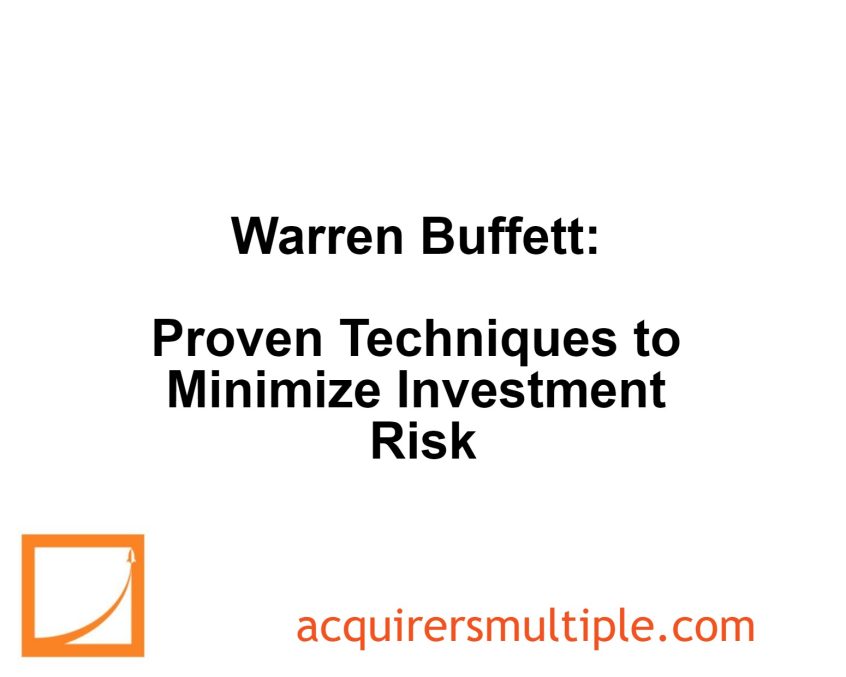During the 1994 Berkshire Hathaway Annual Meeting, Warren Buffett discusses risk as the possibility of harm, which is tied to the time horizon for holding an asset. Short-term trades, like buying and selling within a day, are highly risky. In contrast, long-term investments, such as buying Coca-Cola shares for years, have minimal risk.
Buffett criticizes the academic and financial industry’s reliance on volatility and beta to measure risk, arguing they don’t reflect true risk. Instead, he focuses on the probability of loss over a longer period. Buffett and his partner, Charlie Munger, avoid transactions with high loss expectancy and prefer those with favorable probabilities, reflecting their risk-averse nature but willingness to take calculated risks.
Here’s an excerpt from the meeting:
Buffett: Well, we do define risk as the possibility of harm or injury. And in that respect we think it’s inextricably wound up in your time horizon for holding an asset. I mean, if your risk is that you’re going — if you intend to buy XYZ Corporation at 11:30 this morning and sell it out before the close today, I mean, that is, in our view, that is a very risky transaction.
Because we think 50 percent of the time you’re going to suffer some harm or injury. If you have a time horizon on a business, we think the risk of buying something like Coca-Cola at the price we bought it at a few years ago is essentially, is so close to nil, in terms of our perspective holding period.
But if you asked me the risk of buying Coca-Cola this morning and you’re going to sell it tomorrow morning, I say that is a very risky transaction. Now, as I pointed out in the annual report, it became very fashionable in the academic world, and then that spilled over into the financial markets, to define risk in terms of volatility, of which beta became a measure.
But that is no measure of risk to us. The risk, in terms of our super-cat business, is not that we lose money in any given year. We know we’re going to lose money in some given day, that is for certain. And we’re extremely likely to lose money in a given year.
Our time horizon of writing that business, you know, would be at least a decade. And we think the probability of losing money over a decade is low. So we feel that, in terms of our horizon of investment, that that is not a risky business.
And it’s a whole lot less risky than writing something that’s much more predictable. Interesting thing is that using conventional measures of risk, something whose return varies from year to year between plus-20 percent and plus-80 percent is riskier, as defined, than something whose return is 5 percent a year every year.
We just think the financial world has gone haywire in terms of measures of risk. We look at what we do — we are perfectly willing to lose money on a given transaction, arbitrage being an example, any given insurance policy being another example. We are perfectly willing to lose money on any given transaction.
We are not willing to enter into transactions in which we think the probability of doing a number of mutually independent events, but of a similar type, has an expectancy of loss. And we hope that we are entering into our transactions where our calculations of those probabilities have validity.
And to do so, we try to narrow it down. There are a whole bunch of things we just won’t do because we don’t think we can write the equation on them. But we, basically, Charlie and I by nature are pretty risk-averse.
But we are very willing to enter into transactions — We, if we knew it was an honest coin, and someone wanted to give us seven-to-five or something of the sort on one flip, how much of Berkshire’s net worth would we put on that flip?
Well we would — it would sound like a big number to you. It would not be a huge percentage of the net worth, but it would be a significant number. We will do things when probabilities favor us.
You can watch the entire meeting here:
For all the latest news and podcasts, join our free newsletter here.
Don’t forget to check out our FREE Large Cap 1000 – Stock Screener, here at The Acquirer’s Multiple:



